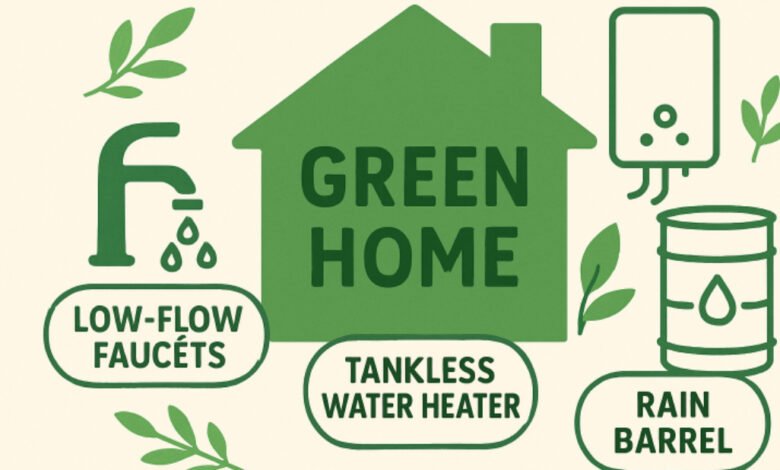Eco-Friendly Solutions for Everyday Plumbing Problems

Key Takeaways
• Installing low-flow fixtures minimizes water waste without sacrificing performance.
• Tankless water heaters and insulated pipes promote energy efficiency while supplying consistent hot water.
• Greywater recycling and composting food waste help reduce environmental strain and save resources.
• Adopting non-toxic cleaning products and routine maintenance practices keeps your plumbing system efficient and eco-friendly.
Creating a sustainable household starts with the way you use and maintain your plumbing systems. By prioritizing eco-friendly solutions, you can save water, reduce energy usage, and lower your utility bills, all while preserving vital resources for future generations. If you encounter urgent plumbing issues that need immediate attention, consider reaching out to emergency plumbing service in Oahu — local specialists. Their expertise ensures efficient plumbing repairs while supporting your sustainable goals.
Whether you’re upgrading your fixtures, addressing leaks, or seeking alternatives to harsh chemical cleaners, implementing green plumbing practices is easier than ever. These eco-conscious interventions not only protect your home’s plumbing but also help contribute to the health of the planet. Read on to discover simple yet effective strategies that turn any home into a model of environmental responsibility.
Low-Flow Fixtures
Switching to low-flow plumbing fixtures is one of the most impactful steps you can take in reducing household water use. Modern low-flow toilets consume about 1.28 gallons per flush, significantly less than older models, and dual-flush systems offer even more flexibility. In showers, installing low-flow showerheads can cut water consumption by up to 50% annually. Sink aerators are another simple upgrade that maintains pressure while using less water per minute, helping homes collectively save billions of gallons of water every year.
Tankless Water Heaters
Traditional water heaters constantly use energy to keep stored water hot, leading to unnecessary consumption and higher bills. Tankless models, on the other hand, heat water instantly as it passes through the system, which means you only use energy when hot water is needed. Not only are tanklessunits more efficient and environmentally friendly, but they also tend to last longer than conventional tanks, making them a sound investment over time. Homeowners will quickly notice a decrease in their monthly energy costs and a virtually endless supply of hot water for daily use.
Greywater Systems
Greywater recycling is an excellent way to maximize water efficiency in the home. Greywater refers to water from showers, sinks, and washing machines—not contaminated by sewage—that can be safely reused for landscaping or flushing toilets. By rerouting this gently used water, households reduce their dependence on fresh water supplies, lower their monthly bills, and support healthier local ecosystems. Greywater systems can be as simple as manual collection or as complex as full-scale installations with pumps and filtration, making it easy to find a solution that fits your needs.
Eco-Friendly Cleaning Products
Many traditional drain cleaners and other chemical-based products are not only hazardous to the environment but also harsh on plumbing pipes, which can accelerate wear and contribute to leaks or clogs. Instead, opt for biodegradable, plant-based alternatives that effectively clean without leaving harmful residues behind. Simple homemade solutions, such as baking soda and vinegar, offer an effective way to clear minor drain blockages and prevent buildup—safer for your plumbing and the planet.
Regular Maintenance
Routinely inspecting your plumbing system helps catch leaks, drips, and other inefficiencies early, preventing water waste and costly repairs down the line. Even small leaks can waste hundreds of gallons per month. Scheduling annual checkups, watching for damp spots or mold growth, and keeping drains clear all contribute to maintaining a healthy, efficient plumbing network at home.
Insulating Pipes
Insulating pipes, especially those carrying hot water, helps prevent energy loss by retaining heat over longer distances. This means less energy is required to keep water at the desired temperature, and you’ll notice faster hot water delivery during showers or kitchen chores. Pipe insulation is particularly important in colder climates, where it can also protect against freezing and ruptures, ensuring your system runs smoothly year-round.
Smart Water Monitors
Smart water monitoring devices track your household’s water usage in real time and alert you to sudden changes that might indicate leaks or excessive use. These monitors can be connected to your phone or smart home system, allowing for instant notifications and actionable insights. By addressing potential problems quickly, you can prevent excessive waste and detect issues before they become serious, all while promoting lasting resource conservation.
Composting Food Waste
Garbage disposals often cause clogs and need more water. Diverting food scraps to compost reduces plumbing pressure and creates nutrient-rich soil. Composting helps divert waste from landfills, cuts greenhouse gases, and promotes food sustainability. Eco-friendly plumbing solutions protect water and energy resources and benefit the environment. Small upgrades, maintenance, and sustainable choices positively impact both home and planet.
Conclusion: Creating a Sustainable and Efficient Home Plumbing System
Adopting water-saving fixtures, tankless water heaters, greywater systems, and eco-friendly cleaning practices helps homeowners reduce resource consumption while lowering utility costs. Regular maintenance, pipe insulation, smart water monitoring, and composting further protect plumbing systems, prevent damage, and promote long-term efficiency. By combining these practical upgrades with mindful habits, households can create a resilient, environmentally conscious plumbing network that supports sustainability, conserves energy and water, and contributes to a healthier home and planet. Small, consistent actions today lead to significant benefits for both your household and the environment.





